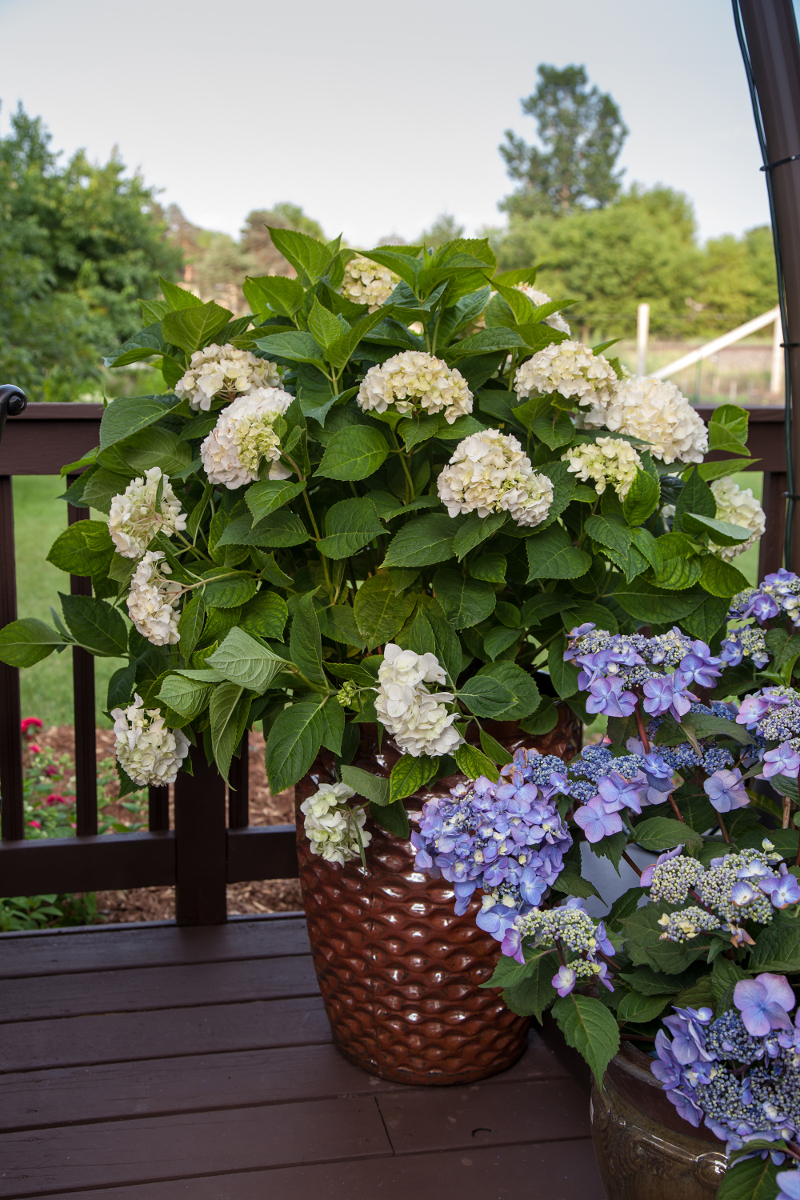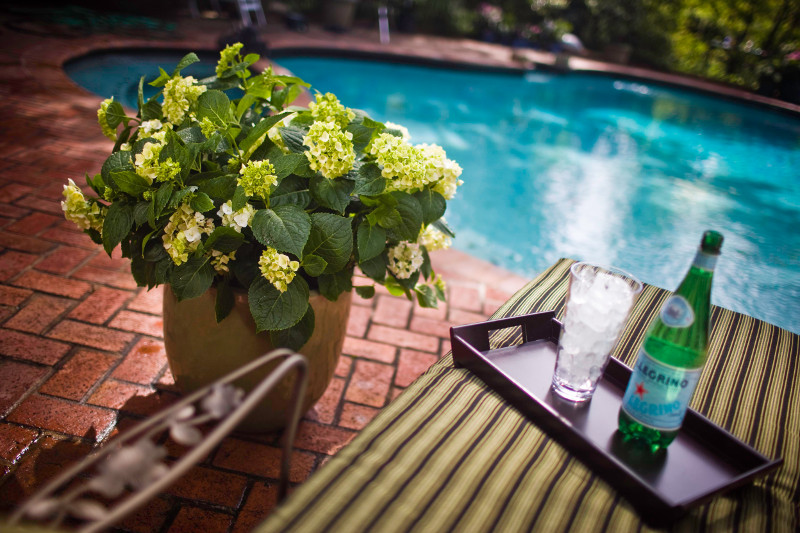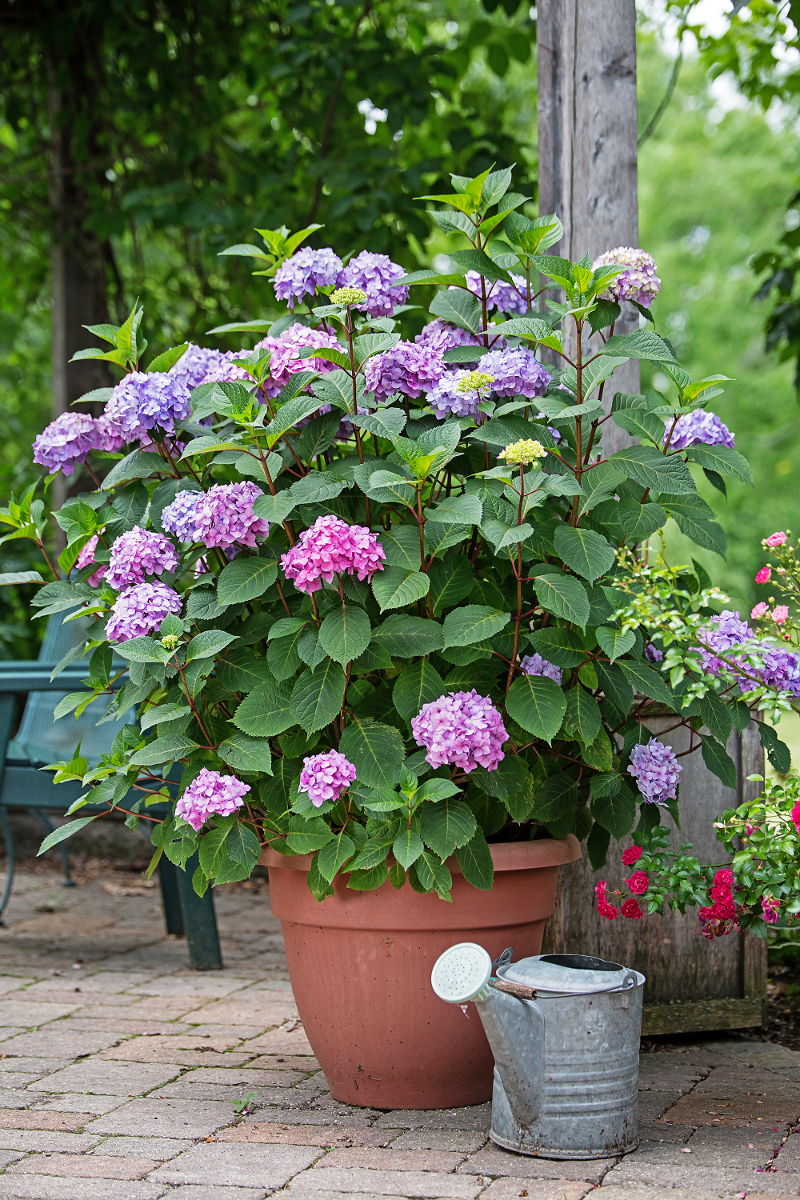Container gardening with hydrangeas is relatively simple. In order to grow hydrangeas in planters, be sure to follow the typical hydrangea care instructions. Hydrangeas grown in the ground or in containers require 3 basic things; well-drained soil, the proper amount of sunlight and lots of moisture.
Growing hydrangeas in pots is a great option for people who are limited in space, or would like to create a beautiful new look in their garden. It is a great option to add some beauty to almost any location that gets enough sunlight including porches, entryways, decks, patios, and balconies. Growing in pots rather than in the ground can also be beneficial if your soil isn't suited well to grow hydrangeas.

Planting Hydrangeas in Pots
The first step in planting is to pick out the right sized planter for the hydrangea that you have. Hydrangeas do not do very well in smaller containers because their roots are aggressive and quickly fill smaller containers. Smaller containers also dry out too fast for what hydrangeas prefer. We typically recommend getting a medium to large sized planter that is at least 2 feet wide.
Once you have the planter picked out, you need to ensure that there are drainage holes at the bottom. This is a requirement for growing hydrangeas in containers, because the roots will rot if the soil doesn't have enough drainage. We also prefer to put a layer of rocks at the bottom to help with drainage. Proper drainage is the most critical step for healthy plants.
Next, you will need to get soil specifically designed for planters. Sometimes topsoil doesn't drain well enough in containers. Feel free to add some compost to the soil as well for added nutrients.
When putting the plant into the pot, plant the hydrangea the same depth in the soil as the plant was growing in the pot it was growing in previously. Leave at least 2 inches from the top of the soil to the top of the planter, so you can water the planter without the water washing out of the top. Gently push down on the soil around the plant to remove air pockets and help firmly hold the plant in the pot.

Caring For Hydrangeas in Pots
Looking after hydrangeas once the shrubs are planted is pretty simple, and very similar to caring for the shrubs in the ground. Be sure the location of the hydrangea meets the growing requirements of the variety that you have. Most hydrangeas prefer morning sun, with afternoon shade to protect the plant during hot summer days with intense direct sunlight. This also reduces how often you will need to water the plants. However, some hydrangeas prefer full sun and some prefer more shaded areas. So knowing the requirements of the variety you are growing is very helpful.
Watering hydrangeas in planters is the 2nd most important step after ensuring there is proper drainage in the container. Different variables will dictate how often you should water, including how large the planter is, how large the plants are, and outdoor weather conditions. Typically, you will need to water hydrangeas in pots at least twice a week. But that can change based on the conditions listed above. A good way to tell if the plant needs water, is if the leaves are droopy. This is the best indicator that the shrub needs more water.
Follow the same guidelines as normal for pruning hydrangeas in pots. Typically, hydrangeas do not need to be pruned though.
Fertilizing hydrangeas in planters should be done in late winter or early spring. Use a generic slow release fertilizer designed for woody plants. Never fertilize hydrangeas in late summer or fall, as that could encourage more growth, when the shrub needs to start preparing for winter.
Caring For Potted Hydrangeas in Winter
In colder climates, you may need to add extra protection for your hydrangeas in planters. The roots are more exposed, especially on the edges of the planters. We've made a guide for protecting hydrangeas in winter if you would like to learn more. Another option is to overwinter hydrangeas in pots in the garage. That way the plants still keep cool, but will not be exposed to extreme freezing or windy conditions.

 |
Author Judith King - Published 10-17-2017 |


